Newsletter
Mar
31
2022
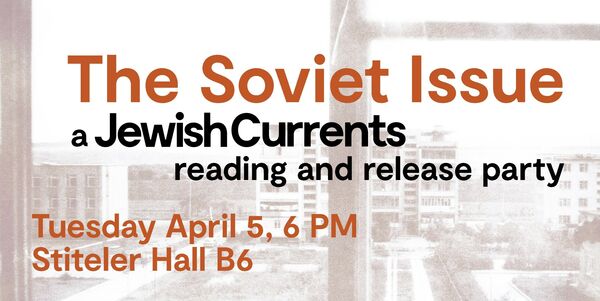
TUESDAY, April 5th, at 6 pm Eastern:
Celebrate the release of
the Winter/Spring 2022 double issue with local contributors and guest
editors! Copies of the magazine will be available.
Featuring readings and a Q&A with:
- Tenant organizer and Georgetown professor Gregory Afinogenov
- Author-illustrator and Penn professor Julia Alekseyeva (guest editor)
- Poet Alina Pleskova
- Writer Egina Manachova
Sponsored by the University of Pennsyvlania’s Department of
Russian and East European Studies (REES), Jewish Studies Program, and
Department of Religious Studies.
Please note: This is an in-person event at the
University of Pennsylvania campus in Philadelphia, open to students and
non-students! Covid-19 vaccination is required.
The event will take place at Stiteler Hall B6, 208 South 37th Street, Philadelphia, PA 19104. For more detail on location, visit the Stiteler Hall information page. You can find the accessibility information here. For questions about accessibility and accommodations, please reach out to us at events@jewishcurrents.org.
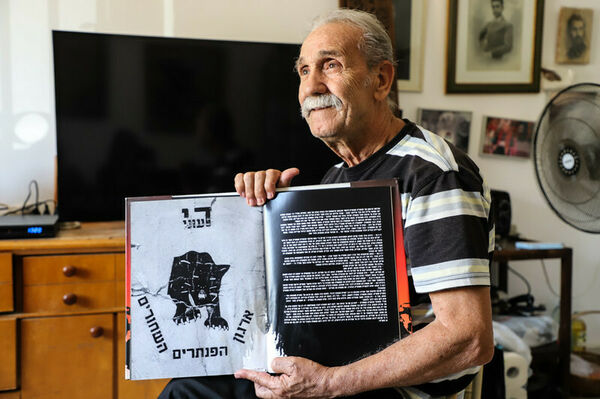
TUESDAY, April 5th, at 6 pm Eastern:
Note: This is a hybrid in-person and livestreamed event! It will take place at Temple Beth Zion at 1566 Beacon Street in Brookline, MA, which is a wheelchair accessible space. Attendees in-person must be vaccinated against Covid and be masked for the event. Information about accessing the livestream will be sent to all registrants.
If you have accommodation requests or questions about accessibility, please reach out to events@jewishcurrents.org.
The Israeli Black Panthers led a movement starting in the early 1970s to challenge Israel’s oppression of Jews from Arab and Muslim countries (later known as Mizrahim). Inspired by the Black Panther Party in the US, they fought for racial and economic justice in housing, employment, and beyond.
This event will feature a conversation and Q&A with Reuven Abergel, one of the founders of the Israeli Black Panthers. Abergel was born in Rabat, Morocco in 1943 and arrived with his family to Israel/Palestine in 1950. Abergel has been a social and political activist in Israel/Palestine for fifty years, combining social and environmental struggles within Israeli society with the struggle for Palestinian rights and human rights.
He will be joined in conversation by Sapir Sluzker-Amran, a Mizrahi feminist lawyer and community organizer, and leader of the Breaking Walls grassroots movement, who is spending a year in Harvard’s Conflict and Peace program.
This Thursday, join Jewish Currents Editor-at-Large Peter Beinart in a discussion with Professor Afinogenov on the war in the region and the American left’s unsatisfactory response.
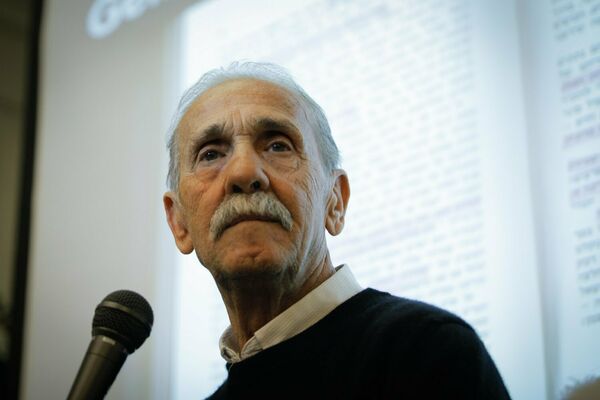
WEDNESDAY, April 6th, at 6:30 pm Eastern:
Note: This event is in person! It will take place at The People’s Forum in New York City. The venue is wheelchair-accessible, and Covid protocols for the event space are forthcoming.
If you have accommodation requests or questions about accessibility, please reach out to events@jewishcurrents.org.
Join us for a conversation and Q&A with Reuven Abergel, legendary leader of the Mizrahi Black Panthers. We will mark 50 years since the revolutionary protests that he and his comrades led in Jerusalem. We will also celebrate the republication of the historic Black Panthers’ Haggadah from 1972. Signed copies of the Haggadah will be available. Moderator: Sapir Sluzker-Amran (Breaking Walls, Harvard University).
The Mizrahi Black Panthers led a movement in the 1960’s and 70’s to challenge the Israeli state’s oppression of Mizrahim (Arab Jews and/or Jews from Middle Eastern and North African countries). Inspired by the Black Panther Party in the US, they fought for racial and economic justice in housing, employment, healthcare, and beyond. Several of their leaders also developed relationships with Palestinian leaders, recognizing the interconnected struggles of Mizrahim and Palestinians.
Reuven Abergel was one of the founders and former leaders
of the Mizrahi Black Panthers. Abergel migrated with his family to
Israel/Palestine from Morocco in the 1950s and soon after, got involved
in local political activism, including the Wadi Salib uprisings. Since
the dissolution of the Israeli Black Panthers, Abergel has continued to
be a leading voice and activist in the Mizrahi struggle and in
solidarity with Palestinians.
This event is sponsored by Jewish Voice for Peace.

SUNDAY, April 3rd, at 2 pm Eastern:
Join Jewish Currents and The New Press for a celebration of Mikołaj Grynberg’s exquisitely original and darkly funny collection of stories I’d Like to Say Sorry, but There’s No One to Say Sorry To, excerpts of which were first published in Jewish Currents as Rejwach. Grynberg, a psychologist and photographer, spent years collecting and publishing oral histories of Polish Jews. His first work of fiction recrafts those histories into dazzling first-person vignettes that explore Jewish identity and the contemporary lives and tensions of a generation still haunted by the Holocaust and its afterlives. The event will feature a conversation between Grynberg and translator Sean Gasper Bye, as well as readings by actor and playwright Wallace Shawn, short story writer Deborah Eisenberg, and translator Antonia Lloyd Jones.
We are thrilled to bring this group of actors and translators together to illuminate Grynberg’s work on our screens. We look forward to seeing you there!
100% of donations from this event will go to Fundacja Ocalenia, which supports refugees in Poland.
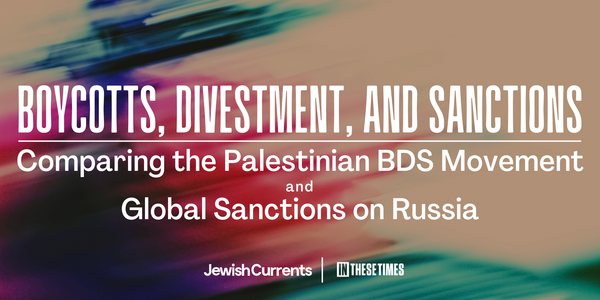
MONDAY, April 11th, at 12 pm Eastern:
In 2005, Palestinian civil society organizations put out a call for Boycott of, Divestment from, and Sanction of Israel (BDS). Premised on “the simple principle that Palestinians are entitled to the same rights as the rest of humanity,” proponents of BDS took as a model the work of Black South African activists who mobilized economic sanctions against the apartheid regime. Now, the United States is working with the European Union and other countries to impose broad, economy-wide sanctions on Russia in response to President Putin’s invasion of Ukraine.
Join movement leaders from Palestine, South Africa, and the United States, for a discussion about sanctions as a tool of social movement. How does the Palestinian-led demand for BDS differ from the sanctions imposed on Russia? What are the shared characteristics of these various sanctions? When are sanctions a tool for justice, and when are they an instrument of violence? Taking as a shared principle solidarity with all who face injustice, from Ukraine to Yemen to Palestine, participants will clarify the tactic of BDS, and explore areas of consensus and non-consensus within the BDS movement.
Participants will include:
Omar Barghouti, co-founder of the BDS movement
Lara Kiswani, Executive Director of the Arab Resource and Organizing Center
Olivia Katbi, North America coordinator for the BDS movement
Ronnie Kasrils, former South African government minister and leading member of the African National Congress during the apartheid era
This event is co-sponsored by In These Times and Jewish Currents. You can read the Palestinian BDS National Committee’s statement about this topic here.
This live event and its recording will have automated closed captioning. For accommodation requests or questions about accessibility, please reach out to events@jewishcurrents.org.
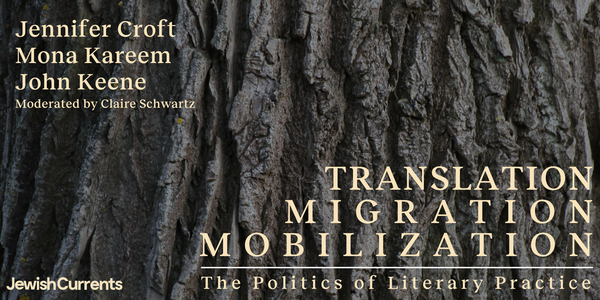
WEDNESDAY, April 13th, at 6 pm Eastern:
In many ways, translation is an invisible art. Only 3% of all books published in English are works in translation; often, translators’ names aren’t even listed on the covers of the books filled with their words. What might focusing on this obscured form reveal about power, nationalisms, and preconceptions hidden in plain sight? What does it mean to bring a text across languages? How might translation help make visible, collaborate with, and contest other forms of movement, migration, and mobilization?
The Politics of Literary Practice
Join Jewish Currents for the last in a series of three conversations—on poetry, criticism, and translation—to explore the relationships between politics and literary form. Considering the history and present of the genres in question, participants will discuss the various ways that textual practices structure our imaginations—and how they chart possibilities for reading, thinking, and living otherwise.
Check out the previous two events in the series: Poetry and Freedom Movement and Criticism as Political Form.
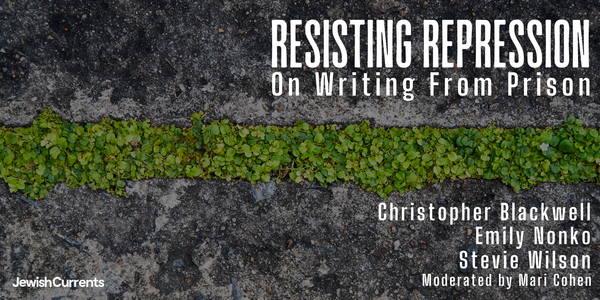
TUESDAY, April 26th, at 12 pm Eastern:
Systems of mass incarceration continue to harm communities across the United States, but often the specific contours of this harm remain invisible to people not directly impacted. Incarcerated journalists and writers are uniquely poised to report on conditions in jails and prisons—and many are working diligently to do so. Yet the obstacles they face are manifold. Incarcerated journalists often face devastating punishments for speaking about the system in which they are forced to reside, while struggling to find publishers willing to share their stories. Join us to hear directly from incarcerated writers about the challenges of writing in a restricted environment, their experiences with repression, and the support they’re seeking for their work.
This live event and its recording will have automated closed captioning. For accommodation requests or questions about accessibility, please reach out to events@jewishcurrents.org.